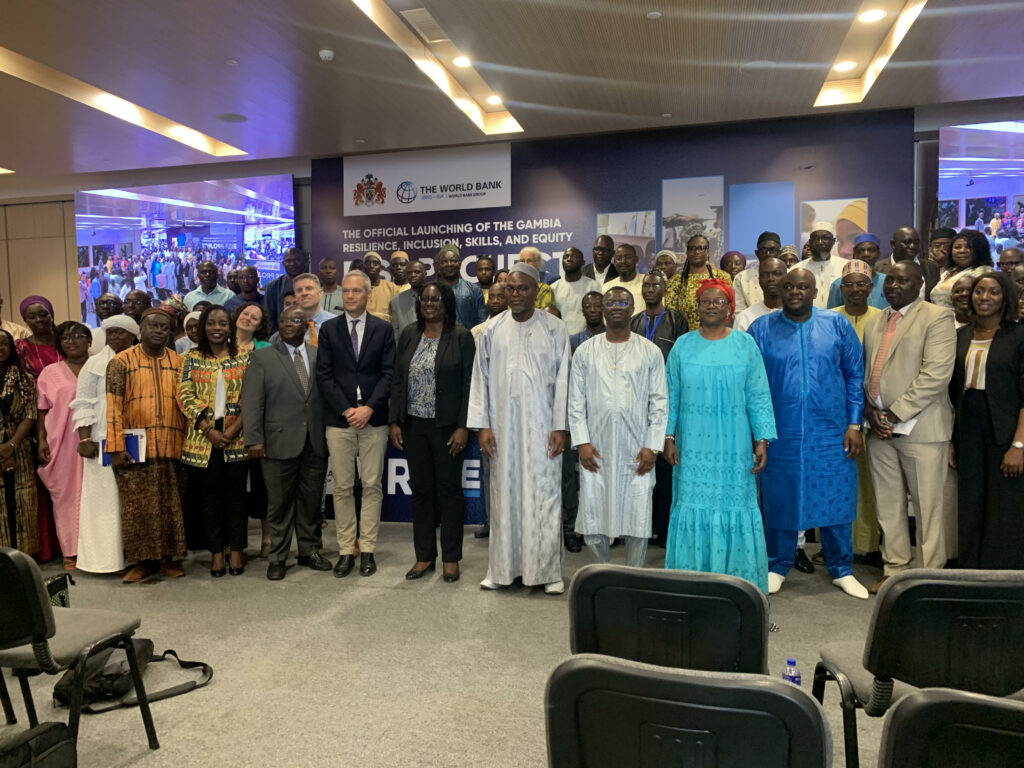Gambia Introduces RISE Initiative to Enhance Economic and Educational Prospects

By Ramatoulie Jawo
The Ministry of Finance and Economic Affairs, with funding from the World Bank, officially launched The Gambia Resilience, Inclusion, Skills, and Equity (RISE) Project at the Sir Dawda Kairaba Jawara International Conference Centre in Bijilo.
The primary objective of this project is to bolster The Gambia’s human capital framework by enhancing the quality and accessibility of education, broadening employment opportunities, and extending social protection to the most vulnerable segments of society.
This event convened government dignitaries, representatives from the World Bank, and other international stakeholders, presided over by the Gambian Vice President.
In his inaugural address, Vice President Muhammad B.S Jallow underscored the expansion of social safety net programs and systems. He emphasized the alignment of the RISE project with the country’s developmental goals as outlined in the Recovery-Focused National Development Plan (Yiriwa).
“The Plan prioritizes Human Capital Development under Pillar 4, amongst other things, to reap the demographic dividend for the country. The Project’s interventions in Foundational learning and Skills development couldn’t have come at a more opportune moment, in view of His Excellency, President Adama Barrow’s unwavering commitment to improve the employability of our youth,”
While acknowledging advancements in education, he acknowledged persisting challenges in foundational learning outcomes, particularly across regions. He reiterated the government’s dedication to fortifying policy frameworks to deliver Technical and Vocational Education and Training (TVET) to bridge the skills gap and enhance youth employability.
“The government registered considerable improvements in education, despite the gains, the government and partners recognize that challenges remain in improving outcomes on foundation learning, with significant regional variations. In our efforts to respond to the needs of the youthful population, The Government of President Barrow continues to strengthen the policy, regulatory, and institutional arrangements to deliver Technical, Vocational, Educational, and Training to address the skills gap in the country and increase the employability of young people. The interventions on RISE are wholesome as they cover critical aspects of the operational plan, which supports nine thematic areas,” he said.
The Vice President expressed gratitude to the World Bank for its collaboration and support, emphasizing their shared commitment to human capital development and poverty alleviation.
“Your commitment to stand ready and willing to support the government in human capital development and eliminating poverty has been reflected in your support to this project and the multitude of projects in other sectors,” he added.
Fayi Boroffice, the World Bank’s resident representative in The Gambia, commended the government’s dedication to addressing key human development challenges. She outlined the project’s objectives for the next five years, envisioning a Gambia where high-quality education, job-relevant skills, and robust social safety nets empower individuals and families to escape poverty.
“The project launched is a crucial step towards our collective efforts to build, utilize, and protect the human capital of The Gambia, paving the way to sustainable development and prosperity. 4,000 (Four Thousand), youth are expected to be engaged in the TVET, 10,000 (Ten thousand) individuals in productive inclusion support. In five years we envision a Gambia where schools deliver high-quality foundational teaching and learning, youth have begun to obtain job-relevant skills, young entrepreneurs have better ecosystems to help their start-ups strive, and the Social safety net program supports the livelihood and resilience of the most vulnerable. Ultimately, providing them with the tools to lift themselves, and their families, out of poverty,” she said.
She assured continued World Bank support for the RISE project and other initiatives aimed at fostering sustainable development in The Gambia.
Professor Pierre Gomez, Minister of Higher Education, Research, Science, and Technology, emphasized the importance of expanding access to labor markets and enhancing the relevance of technical and vocational education and training (TVET) programs. He stressed the need for education to empower citizens to innovate and create employment opportunities.
“Governments face the daunting challenge of university or TVET graduates seeking employment in public or private entities. To build a more prosperous and harmonious society, it is imperative that citizens are provided with opportunities to become highly skilled and self-reliant. Education must empower us to become innovators and job creators rather than relying on handouts,” he said
He stated that in line with this vision, MoHERST, in collaboration with its partners, is dedicated to expanding access to TVET programs and ensuring their equity, high quality, and relevance to all Gambians. Their goal is to equip citizens with the skills and knowledge necessary to foster innovation and establish sustainable employment opportunities.
Professor Gomez emphasized that the project represents a crucial advancement for human development in The Gambia, noting that its launch signifies a significant milestone in enhancing human capital.
Minister of Basic and Secondary Education, Haddy Jatou Sey, of MoBSE, remarked that the project seeks to alter the course of education in The Gambia. She urged stakeholders and partners to collaborate to improve the Gambian educational system for the benefit of future generations.
She also highlighted that the country has a student population exceeding 800,000 in basic and secondary education, affirming, “Therefore, my ministry is deeply involved and stands to benefit significantly from this project.”

